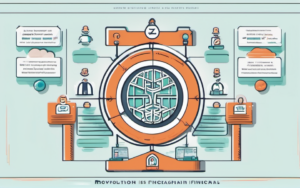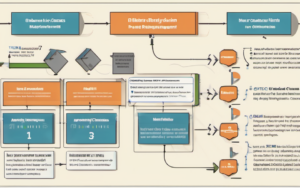The growing demand for sustainable and ethical practices is driving a shift towards responsible consumption across various industries. Blockchain supply chain technology is emerging as a powerful tool to address these concerns, offering transparency, traceability, and accountability throughout the supply chain. This innovative technology has the potential to revolutionize how we produce, distribute, and consume goods, paving the way for a more sustainable future.
Blockchain: A Catalyst for Sustainable Supply Chains
The global supply chain is a complex network that often lacks transparency and accountability, making it challenging to ensure sustainable practices. Consumers are increasingly demanding information about the origin and production processes of the products they buy. This is where blockchain technology comes into play.
The Need for Transparency and Traceability
Consumers are seeking information about the environmental and social impact of the products they buy. They want to know that the products they consume are made ethically and sustainably. This requires transparency and traceability throughout the supply chain, from raw material sourcing to final product delivery. Traditional methods of tracking and verifying information often rely on manual processes, which can be prone to errors and manipulation.
Blockchain’s Role in Enhancing Sustainability
Blockchain technology provides a secure and transparent platform for recording and sharing data across the supply chain. Its decentralized nature ensures that information is accessible to all authorized parties, eliminating the need for intermediaries and reducing the risk of fraud or manipulation. This transparency enables stakeholders to track the origin and journey of products, ensuring compliance with ethical and sustainable practices.
Key Applications of Blockchain in Sustainable Supply Chains
Blockchain technology has several practical applications that can significantly enhance the sustainability of supply chains.
Tracking and Verifying Sustainable Practices
Blockchain can be used to track and verify sustainable practices throughout the supply chain, providing consumers with assurance that products meet ethical and environmental standards.
Farm-to-Table Traceability
Blockchain can track the journey of food products from farm to table, enabling consumers to trace the origin of their food and ensure that it meets sustainable farming practices.
Sustainable Sourcing of Raw Materials
Blockchain can be used to track the sourcing of raw materials, verifying that they are sustainably harvested and sourced from responsible suppliers. This can help to combat illegal logging, deforestation, and other environmentally harmful practices.
Reducing Waste and Emissions
Blockchain can optimize logistics and inventory management, reducing waste and emissions throughout the supply chain.
Optimizing Logistics and Inventory Management
Blockchain can streamline logistics processes by providing real-time visibility into inventory levels, transportation routes, and delivery times. This helps to optimize routes, minimize delays, and reduce transportation-related emissions.
Carbon Footprint Tracking and Reduction
Blockchain can be used to track the carbon footprint of products, identifying areas for improvement and promoting carbon neutrality.
Promoting Fair Trade and Ethical Sourcing
Blockchain can help to promote fair trade and ethical sourcing practices by ensuring fair compensation for producers and combating unethical practices.
Ensuring Fair Compensation for Producers
Blockchain can be used to track and verify payments to producers, ensuring that they receive fair compensation for their products. This helps to combat exploitation and promote economic empowerment.
Combating Illegal and Unethical Practices
Blockchain can help to track the movement of goods and identify any instances of illegal or unethical practices, such as forced labor or the use of conflict materials.
Benefits of Blockchain for Sustainable Supply Chains
Implementing blockchain technology in supply chains offers significant benefits in promoting sustainable and ethical practices.
Increased Transparency and Trust
Blockchain provides a transparent and immutable record of transactions and events, fostering trust and accountability among stakeholders. Consumers can have confidence in the origin and sustainability of the products they buy.
Improved Efficiency and Cost Savings
Blockchain can streamline processes, reduce administrative overhead, and eliminate the need for intermediaries, leading to improved efficiency and cost savings.
Enhanced Sustainability and Environmental Impact
By enabling transparency, traceability, and accountability, blockchain technology helps to reduce waste, optimize logistics, and promote sustainable practices, ultimately minimizing environmental impact.
Challenges and Considerations
While blockchain technology holds immense potential for sustainable supply chains, there are challenges that need to be addressed.
Scalability and Interoperability
Scaling blockchain solutions to handle large volumes of data and integrating them with existing systems can be challenging. Interoperability between different blockchain platforms is also crucial for widespread adoption.
Data Privacy and Security
Maintaining data privacy and security is essential, especially when handling sensitive information about producers, suppliers, and consumers. Robust security measures and data encryption protocols are crucial.
Adoption and Integration Costs
Implementing blockchain technology requires significant investment in infrastructure, software, and expertise. The costs associated with adoption and integration may be a barrier for some businesses.
The Future of Blockchain in Sustainable Supply Chains
Blockchain technology is rapidly evolving, and new innovations are emerging that will further enhance its ability to promote sustainable supply chains.
Emerging Technologies and Innovations
The development of new technologies, such as Internet of Things (IoT) and artificial intelligence (AI), can be integrated with blockchain to provide even greater transparency and efficiency.
Collaboration and Partnerships
Collaboration between industry players, governments, and non-governmental organizations is crucial for developing and implementing blockchain solutions effectively.
A More Sustainable and Ethical Future for Supply Chains
As blockchain technology continues to mature and gain wider adoption, it has the potential to transform supply chains into more sustainable and ethical systems. By increasing transparency, accountability, and efficiency, blockchain technology can help to create a more responsible and sustainable future for businesses, consumers, and the environment.




